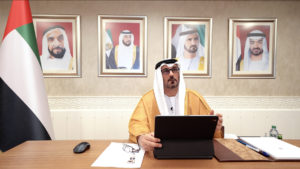UAE Continuing To Harness Technology, R&D To Deliver Development Goals, Says Hussain Al Hammadi
The UAE is continuing to harness the potentials and create ways and close cooperation between the countries of the Gulf Cooperation Council, GCC, to benefit from science and technology supported by research, to find solutions to common challenges, encourage youth to innovate and entrepreneurship, develop infrastructure, legal and regulatory legislation, and employ technology for the development of government services, affirmed Hussain bin Ibrahim Al Hammadi, Minister of Education.
”It is important to monitor their implementation and incorporate them in strategic plans and aspects of the educational process,” Al Hammadi said in his opening address while chairing the 20th virtual meeting of the GCC Ministers of Higher Education and Scientific Research.
“Today we are in a dire need to strengthen coordination and work, and exchange experiences, in light of the COVID-19 pandemic, and its direct effects on education systems, and to overcome the repercussions of this emergency health reality,” he noted.
He stated, “We continue a new chapter of cooperation and work that reflects an educational scene that we seek to achieve. It consists of promoting scientific research, relying on technology, employing technology and Artificial Intelligence, and devoting innovation in higher education institutions, which has become an inevitable necessity. It is capable of achieving competitiveness represented in qualitative outputs that lead the future of our country, and leave its imprint and originality in the labour market and the development and prosperity of our national institutions.”
In September 2017, the Ministry of Education launched the National Strategy for Higher Education 2030 during the Annual Meetings of UAE Government. The strategy sets out to build and achieve the highest scientific and professional education standards to serve the UAE’s future generations.
He said, “The UAE proposes that the recommendations issued by the education workshop in light of the pandemic be studied by a high-level committee, with the support of the General Secretariat, to determine priorities and maintain strategic recommendations.”
He said that the survey of graduates is one of the most important tools that give ministries and institutions of higher education feedback on the quality of the educational process and the quality of their outputs. The graduate administration and the labour market is also conducting similar surveys involving employers.
Addressing the meeting, Dr. Nayef Al Hajraf, Secretary-General of the GCC, noted that the most important challenges facing higher education institutions are the development of the knowledge economy, which is based on the production, dissemination and use of knowledge and information in various productive and service activities, the advancement of society and its transformation into a knowledge society.
He pointed out that scientific research has a fundamental role in “our present age” as a tool to develop knowledge, creativity and innovation, and to provide information for decision-makers to find solutions to problems and advance progress.
The meeting discussed, among other items on its agenda, the frameworks to contain the COVID-19 pandemic, GCC strategic cooperation plan for higher education and scientific research.








 Email: info@cyber-gear.com
Email: info@cyber-gear.com